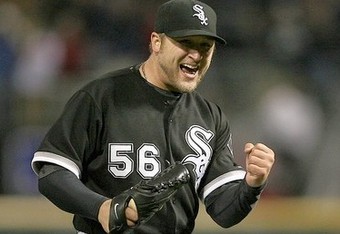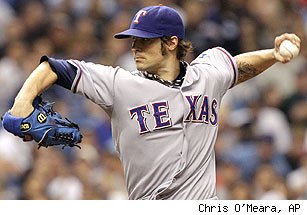With baseball’s
annual Winter Meeting now three weeks away, Nationals’ general manager Mike
Rizzo continues to focus on adding an experienced center fielder and a veteran
starting pitcher.
 |
| Roy Oswalt -- The Best Fit In Washington? |
My guess is that
if Rizzo is going to make a splash at the meetings, it’s going to be with a
pitcher. If they have to, the Nationals can probably get by with a holdover
from last season (Rick Ankiel or Roger Bernadina) or a platoon of veterans
capable of giving the team some steady-if-unspectacular offense while providing
steady defense.
But adding another
veteran starter is imperative if the team is going to make a true pennant run.
Sure, Brad Peacock or Ross Detwiler or Tommy Milone might come out of nowhere and give the team 12-14 wins, but they
probably won’t.
One more quality
starter to go along with Stephen Strasburg, Jordan Zimmermann, John Lannan and
Chien-Ming Wang could actually make the Nationals—gulp, dare I say it?—an early
favorite in the hunt for one of now two Wild Card berths.
There are several
pitchers that meet Rizzo’s requirements, namely a veteran, “innings eater” type
who doesn’t have a history of injury problems.
Right now, Mark
Buehrle, Roy Oswalt and C.J. Wilson are the most coveted of the available free
agents.
Who should be the
Nationals’ top choice among the three? Let’s take a look at their comparative
statistics:
Roy Oswalt (Age: 33)
Career Average:
16-10, 3.29, 8.7/2.1/7.9
2011: 9-10, 3.69,
9.9/2.1/6.0
TSN Scouting Report:
Assets: Has pinpoint control and an ability to throw
plenty of first-pitch strikes. He's also an innings-eater with a winning
attitude and leadership qualities.
Flaws: His diminutive stature has started to take its
toll, as he's not as dominant as he used to be. Also gives up a few too many
hits.
 |
| Mark Buehrle Seems GM Mike Rizzo's Favorite |
Mark Buehrle (Age: 32)
Career Average:
15-11, 3.83, 9.5/2.0/5.1
2011: 13-9, 3.59,
9.7/2.0/4.8
TSN Scouting Report:
Assets: One of the game's great work horses, he
doesn't fatigue much late in the game. Logs a lot of innings, pitches to
contact and can lead a staff. Is successful throwing an array of off-speed
pitches.
Flaws: When he loses focus, he gets knocked around
for big innings. That's due to less-than-stellar velocity and average stuff. At
times, he can take a while to regain his focus when on the mound.
 |
| C.J. Wilson Has Just 2 Years of Starting Experience |
C.J. Wilson (Age: 30)
Career Average
(as starter): 16-8, 3.14, 7.4/3.5/7.9
2011: 16-7, 2.94,
7.9/3.8/8.1
TSN Scouting Report:
Assets: Pitches
aggressively with a low-90s fastball that has great movement. Also boasts a
good curve and solid change-up. Constantly challenges hitters. Is capable of
dominating left-handed batters. Can close, set up or start.
Flaws:
Right-handed hitters have a little more success than lefty bats, so greater
refinement in his pitches could help. Must improve his durability and stamina
to thrive in the starting rotation.
There is no
question that all three pitchers have the potential to help the Nationals
become contenders, but that doesn’t mean they all bring the same abilities.
Of the three,
Wilson will likely cost the most and require the longest contract. Reports from
multiple sources indicate that he has set his sights on a six-year, $120
million deal. And while there is no way he’s going to get that much, he’s going
to come close as the top free-agent pitcher of the litter.
I think a more likely
scenario is $80 million over five years with an easy-to-reach sixth year
option.
That is way too
much money for any free agent pitcher not named Sabathia, but it is especially
too much considering that Wilson has only been a starter for two years and has
only 73 starts under his belt.
I mean, who’s to
say that he won’t revert back to his days before becoming a starter when he
averaged 4.1 walks per nine-innings and had a bloated 4.30 ERA?
With the kind of
money Wilson is going to get, the Nationals can buy a quality starter and a
decent center fielder.
Signing Wilson
makes no sense, not from a talent perspective and not from a financial
perspective. Let the Yankees overpay for him.
And though Mark
Buehrle has been a model of consistency for the Chicago White Sox, his stats
don’t suggest that he is anything more than a good, consistent pitcher.
 |
| Mark Buehrle Seems Too Much Like This Guy |
And those stats look close enough to current
Nationals’ lefty John Lannan that I’m not sure it makes sense to give the
32-year-old what he’s asking for, and no, I’m not suggesting John Lannan is the
same pitcher as Mark Buehrle.
But take a look
at their career averages based on a 162-game season:
Mark Buehrle:
15-11, 3.83 ERA,
223 Innings Pitched, 9.5 hits per 9 innings / 2.0 walks per 9 innings /5.1
strikeouts per 9 innings.
John Lannan:
10-14, 4.00, 200
Innings Pitched, 9.4 hits per 9 innings / 3.4 walks per 9 innings / 4.7
strikeouts per 9 innings.
Their lines just
aren’t as different as you would expect. Lannan’s ERA is a bit higher, and he
gives up one more walk per game, but his hits allowed and strikeouts allowed
are about the same.
But look at this:
In 33 starts, Lannan gave up 90 runs. Buehrle allowed 93 runs in one less
start. That’s as close to identical two pitchers can be without being exactly
identical.
And Lannan
averaged 5.6 innings per start while Buehrle went 6.5 innings per start.
Man, that’s just
too similar.
I doubt that John
Lannan is going to be as successful as Buehrle over his career—in fact, I think
we can count on that—but that doesn’t mean they aren’t similar pitchers. True,
Buehrle has averaged 15 wins per major league season and Lannan only 10, but
Lannan has spent his career on a truly terrible team.
Over Buehrle’s
career, the White Sox have averaged 87 wins per season, and in the three
seasons where they finished below .500, Buehrle had three of his worst seasons,
winning 10 games in 2007 and 13 in both 2009 and 2011.
Lannan’s
Nationals, on the other hand, have averaged just 66 wins during his time in
Washington, 21 games fewer than the White Sox. Had he played with the White Sox
during that same period, he would have likely averaged 12-13 wins per season.
So really, Mark
Buehrle is a 2-3 win improvement over John Lannan, and that just doesn’t
warrant the millions it will cost the team to get him.
In the end, I
think that the least attractive of the three free agents could be the best fit
in Washington.
Of the three, Roy
Oswalt will require the least amount of guaranteed money and the fewest number
of guaranteed contract years, due in part to injuries that have slowed him over
the last couple of seasons.
From 2001 through
2010, Oswalt averaged 30 starts per season, going 15-8 with a fine 3.18 ERA.
But he was limited to just 23 starts in 2011 and injuries robbed him of some of
his efficiency. He went 9-10, 3.69 last season, giving up two more hits per
nine-innings and striking out two less batters per nine.
 |
| Zimmermann & The Other Kids Could Use A Teacher |
But Oswalt would
bring far more to the Nationals than wins. He is a leader in the clubhouse,
just the kind of guy that Mike Rizzo likes. The top three Washington starters—Strasburg,
Zimmermann and Lannan—are all 26 or younger and fourth starter Chien-Ming Wang,
while 31, has just 115 career starts, a relatively small number for his age.
John Lannan, four years younger, has 13 more starts than Wang.
Oswalt could
bring a winner’s mentality to the starting rotation. He could be a teacher, a
leader and darn fine starter. Because of his age, it is likely that Washington
would not want to / have to commit to a long-term deal, making that rotational
slot available to one the team’s young pitchers in a relatively short period of
time.
To be able to
contend, the Washington Nationals need a “rock” in the rotation to give the
kids time to turn winning ability into games won. Once that happens—say in a
couple of years—the team could then afford to bring in one of the bevy of young
arms they have stockpiled and still contend.
The Nationals
contention window will open with the beginning of spring training and looks
like it could be a five-year window. For now, the team will need an influx of
outside veteran talent to win before ultimately letting the maturing youngsters
lead them through those outlying years.
No question, though:
it’s going to be a fun ride over the next few years. And goodness knows, after
the last seven seasons, we’ve earned it.

No comments:
Post a Comment